Key takeaways:
- Water conservation leads to financial savings and environmental protection, benefiting both personal budgets and local ecosystems.
- Effective methods include smart irrigation systems, rainwater harvesting, and adopting mindful water usage habits.
- Community initiatives, like rain garden projects and water-saving workshops, foster collective responsibility and enhance awareness.
- Small daily habits, such as shorter showers and installing aerators, can significantly reduce water consumption over time.
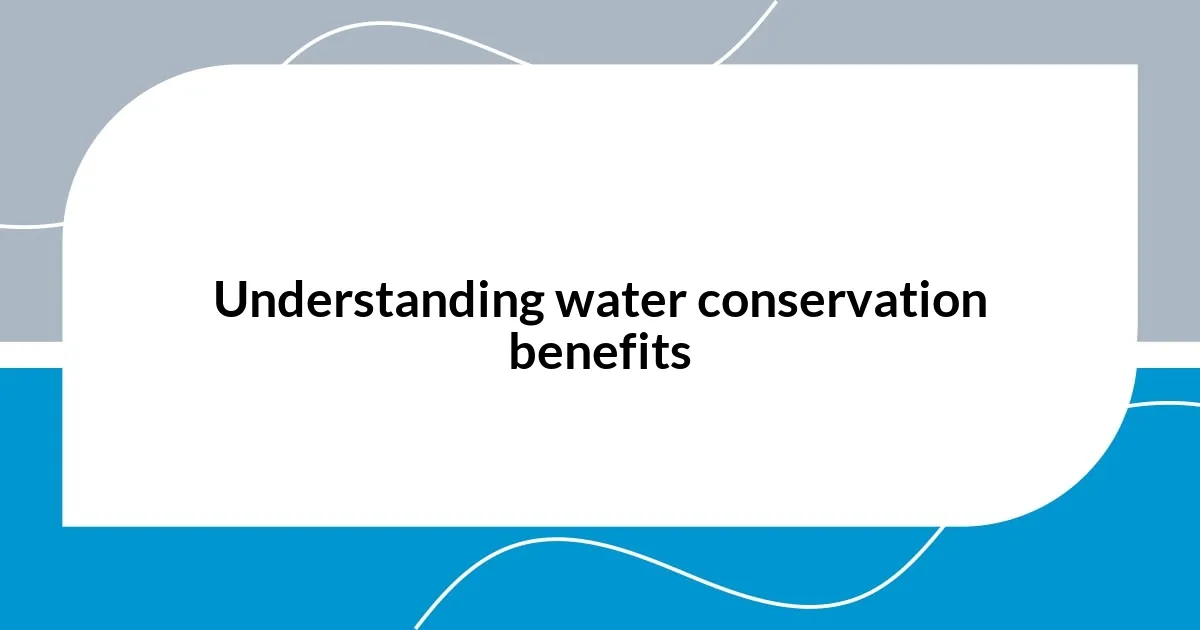
Understanding water conservation benefits
Water conservation isn’t just a responsible choice; it’s a necessity that comes with immense benefits. I remember when I first started being conscious about my water usage. Simple steps, like fixing leaks or using a rain barrel, didn’t just save water—they also significantly cut my utility bills. It felt amazing to not only help the environment but to also see tangible savings reflected in my budget.
Have you ever thought about the broader impact of saving water? Each drop conserved contributes to a healthier ecosystem. Prioritizing water conservation also means protecting local wildlife and maintaining the delicate balance of our water supply systems. I often find myself reflecting on the simple act of turning off the tap while brushing my teeth—it seems small but reminds me that every action counts, leading to a cumulative effect that can truly make a difference.
Besides the environmental and financial benefits, there’s also a profound personal satisfaction that comes from conserving water. It instills a sense of responsibility and connection to the world around us. I often share this journey with friends and family—it’s heartwarming to encourage others to join and see their own small changes blossoming into a shared commitment to sustainability. What changes can you make today that will cultivate that same sense of community and awareness in your life?
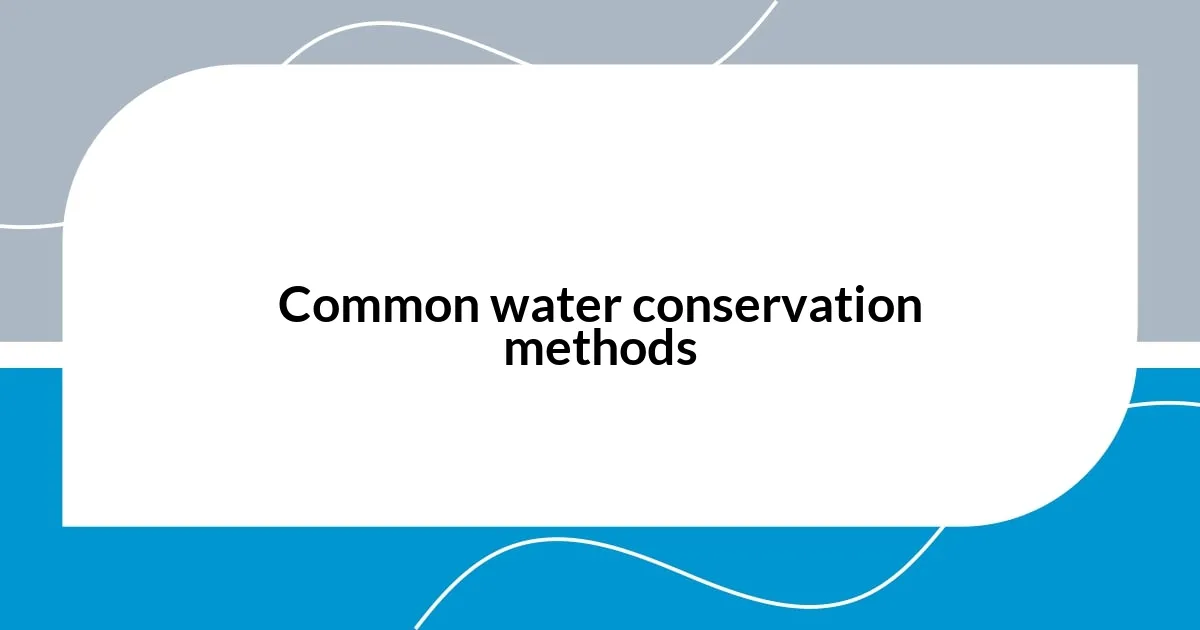
Common water conservation methods
Water conservation methods are varied, each with its unique advantages. One method I’ve found particularly effective is using a smart irrigation system. These systems adjust watering schedules based on weather conditions, ensuring that plants receive just the right amount of water. I remember installing one in my garden, and it not only reduced water usage significantly but also kept my plants thriving without me having to worry about the schedule.
Capturing rainwater is another fantastic strategy that I’ve embraced. Have you ever thought about how much water runs off your roof during a rainstorm? I installed a rain barrel, and watching it fill up during the rainy season has been quite rewarding. I now use that captured water for my garden, effectively recycling what would otherwise go to waste. It’s a simple act that makes a big difference—both for my plants and my water bill.
Lastly, I can’t stress enough the importance of mindful water use in everyday activities. Reducing shower time or opting to take shorter baths has been a game changer for me. Initially, it felt like a challenge to adjust my habits, but I’ve found that it’s often more about mindset. Now, it feels like a refreshing ritual, knowing that I’m doing my part in conserving precious water resources while also enjoying moments of mindfulness.
| Method | Description |
|---|---|
| Smart Irrigation | Automatically adjusts watering based on weather conditions. |
| Rainwater Harvesting | Collecting rainwater for reuse in gardens and landscaping. |
| Mindful Everyday Usage | Adopting habits to reduce overall water consumption. |
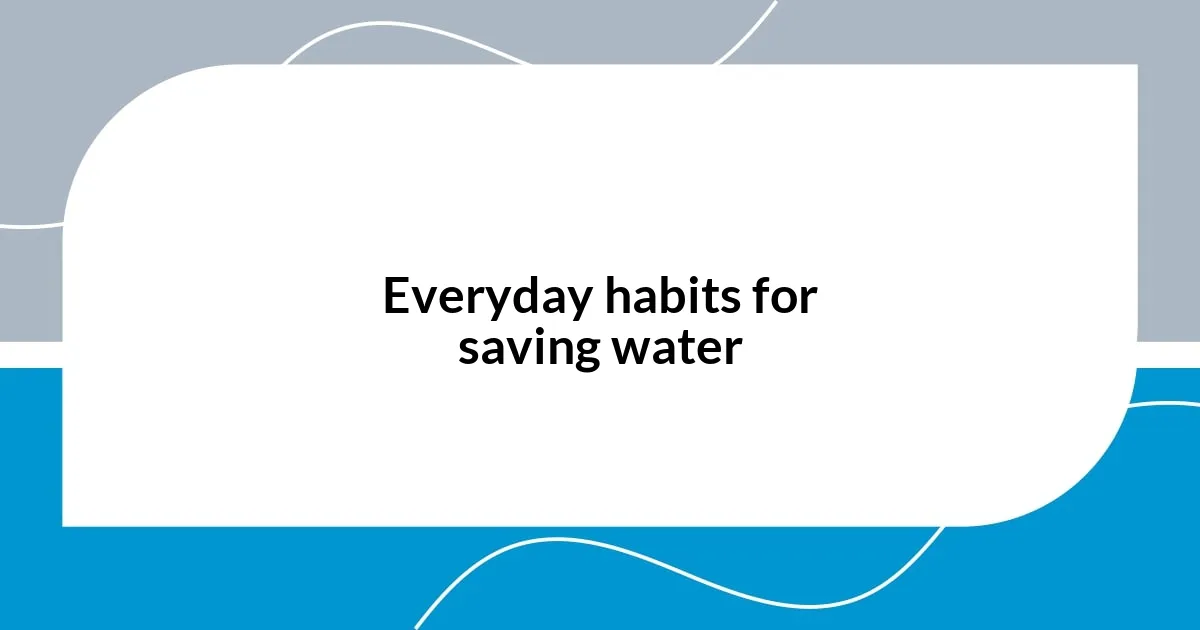
Everyday habits for saving water
I’ve discovered that even the smallest habits can lead to significant water savings over time. For instance, turning off the shower while lathering up has become second nature for me. At first, I found it a bit awkward, but now it feels like a mini-challenge I welcome each time I shower. It’s not just about saving water; it’s a fulfilling reminder that I can make little adjustments that count.
Here are some everyday habits that can help conserve water:
- Shorten Showers: Aim for a maximum of 5-10 minutes.
- Install Aerators: Attach these to your faucets to reduce flow without losing pressure.
- Only Run Full Loads: Wait to run the dishwasher and washing machine until they are full.
- Use a Broom, not a Hose: Sweep driveways and sidewalks instead of hosing them down.
- Turn Off the Tap: Don’t let the water run while brushing teeth or washing hands.
Adopting even a few of these habits has made a noticeable impact on my water usage. Each little change contributes to a larger goal, making me feel more empowered and connected to my environment. It’s refreshing to know that my daily decisions add up!
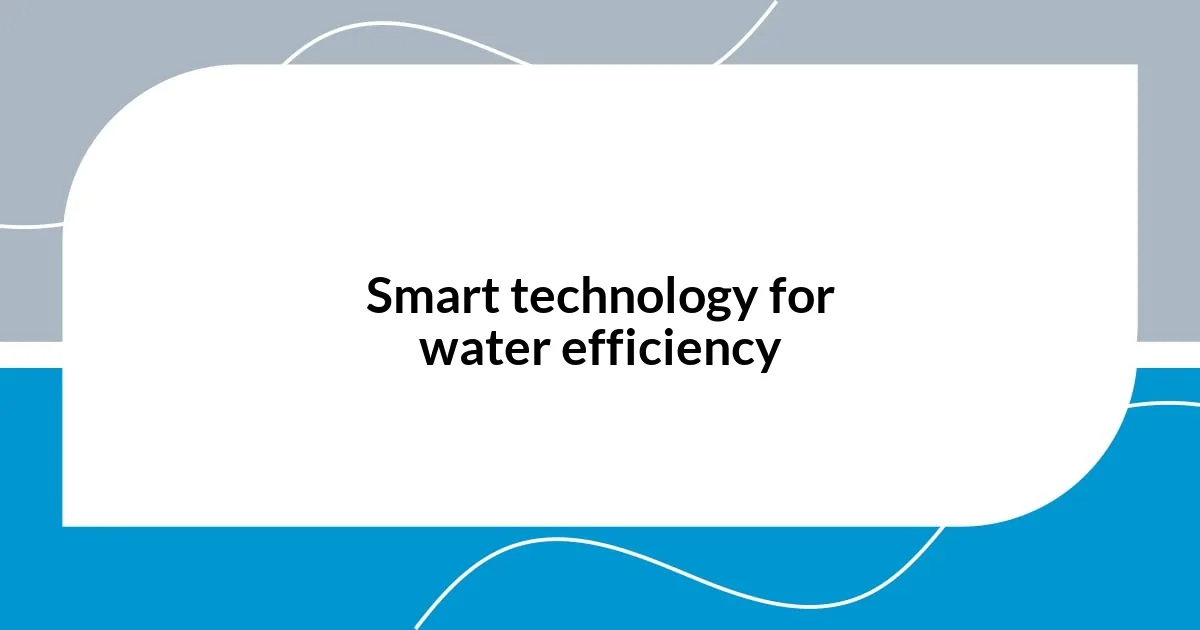
Smart technology for water efficiency
When it comes to smart technology for water efficiency, I’ve been amazed by the integration of sensors and applications in modern systems. For example, I decided to install a smart rain sensor in my yard, which automatically detects when it’s rained and skips the next watering cycle. It felt like a little oversight miracle! I was simply thrilled not to be wasting water on an already soaked garden—that intuitive technology has made such a difference in my routine.
Another incredible advancement I’ve come across is the use of smart home systems that track not just irrigation but all household water use. Personally, I started using a smart water monitor that connects to my plumbing and provides real-time data on my water consumption. Initially, I was surprised to see how certain daily habits contributed to water waste. Now, I can adjust my usage based on the insights it provides. It’s quite empowering to see the tangible impact of my choices right on my phone screen.
Then there are smart appliances, like dishwashers and washing machines, designed to use less water while still delivering excellent performance. After upgrading to a water-efficient dishwasher, I noticed not just the savings on my bill but also the satisfaction of knowing I was using less water than before. Have you ever thought about how much water you could save by making a simple switch like that? For me, it’s not just about the numbers; it’s about the peace of mind that comes with being mindful of my resources.
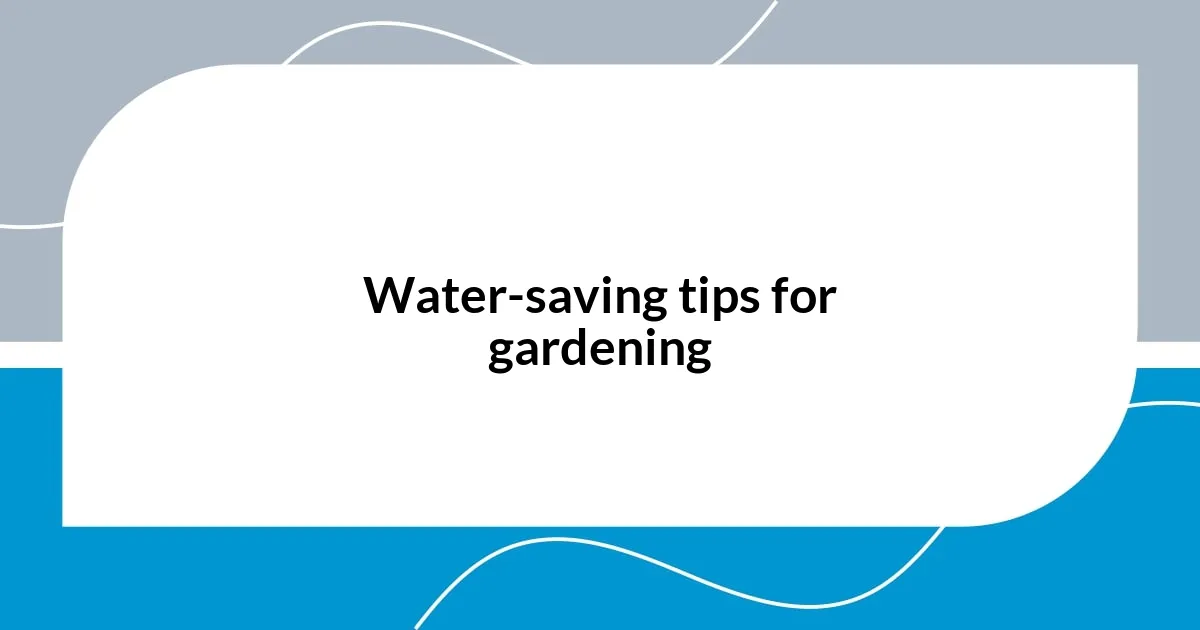
Water-saving tips for gardening
In my gardening journey, I’ve discovered the beauty of mulching. It’s not just about aesthetics; applying a thick layer of organic mulch around my plants has dramatically reduced the need for frequent watering. It keeps the soil moist, suppresses weeds, and even adds nutrient value as it breaks down. Have you tried it? I remember when I first mulched my flower beds—I couldn’t believe the difference it made, turning a chore into a more manageable and enjoyable experience.
Another strategy that has worked wonders for me is watering early in the morning or late in the evening. The cooler temperatures during these times reduce evaporation, maximizing the benefits of each drop. Initially, I struggled with the early mornings, but now it’s become a peaceful routine. Listening to the birds while tending to my plants keeps me connected with nature. Such moments can feel rejuvenating, don’t you think?
I’ve also found that grouping plants with similar water needs together creates a more efficient watering system. It’s like cultivating a community of plants that thrive together! This way, I avoid overwatering and can focus my efforts where they matter most. I remember my first attempt at this—it was a game-changer for my vegetable garden. Not only did I save water, but the plants flourished, and harvest time was more bountiful than ever. It truly felt rewarding to see my efforts reaping rewards.
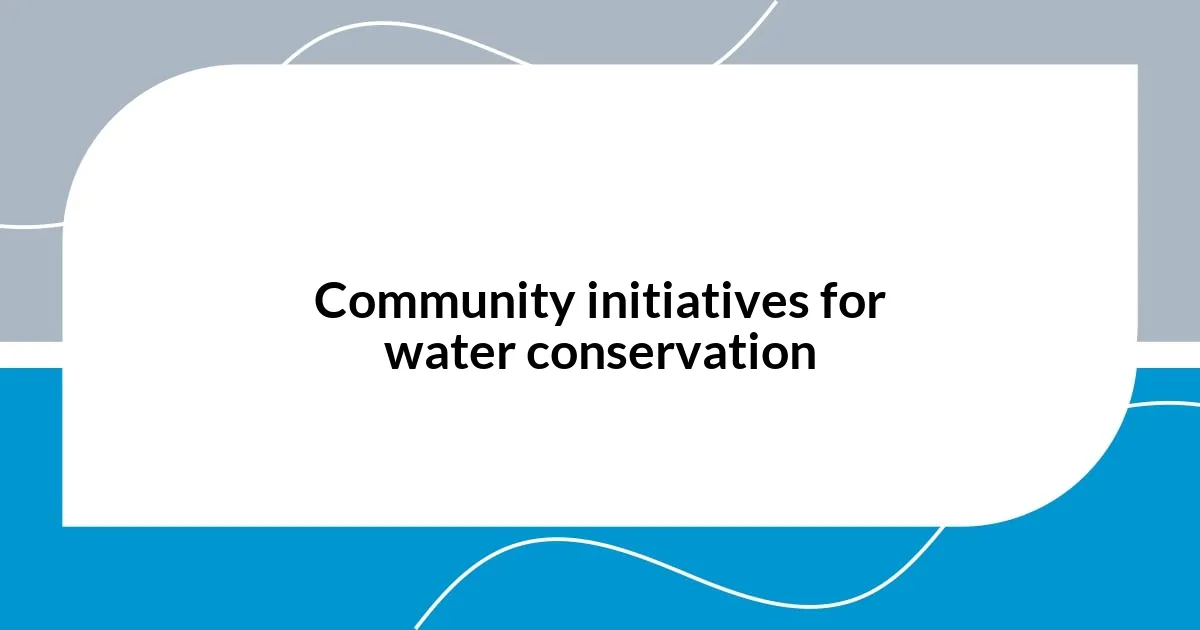
Community initiatives for water conservation
One community initiative that I found impactful is the local rain garden project in my neighborhood. It’s incredible to see how residents came together to transform unused lots into beautiful spaces that absorb rainwater and reduce runoff. I remember attending one of the planting days; everyone brought their families, and the energy was contagious. Participating in this initiative made me feel like I was part of something bigger, contributing to both the environment and our community’s resilience against flooding.
Additionally, our town organizes regular workshops on water conservation techniques, which I absolutely love. I once attended a session on drip irrigation systems, and it completely shifted my perspective on watering my garden. Having hands-on experience with experts felt invigorating, and I left with a newfound confidence to implement what I learned. Have you ever been to a community workshop that left you feeling empowered? It was eye-opening for me to realize how sharing knowledge can lead to collective change.
Another initiative that stands out is the neighborhood challenge focused on reducing water usage. Each household tracks its water consumption, and we compete for the title of “most efficient.” I was skeptical at first, thinking, why bother? But as I got into it, I found myself making small yet significant adjustments—like collecting greywater for my plants. The camaraderie forged through this friendly competition created a fun atmosphere, making water conservation feel less like a chore and more like a shared goal. Isn’t it fascinating how a little bit of accountability can shift our habits?